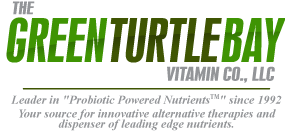Carcinogen Plastic
Subject: microwave + plastic = carcinogen an area of controversy!
There is some controversy over this issue of microwaving plastic. Since heat is know to release substances (remember we leach iron into our food from cooking in an iron skillet), I would personally opt on the side of caution. It may just be safer to use tempered glass, Corning Ware, etc.
Editor, The Green Turtle Bay
From:
Gary Nach <gnach@k-online.com>
To: webmaster@energywave.com
Would you care to update your webpage cover of the email chain letter with the REST of the story instead of just sensationalism? Check out:
http://198.64.129.160/toxins/plastic.htm
No vested interest other than the truth.
1. In fact, the FDA does test plastic wraps.
2. The University of California, Davis Medical Center (not referenced in your version) does not release health warnings.
3. The author/s Jule Klotter appear to be bogus also.
Thought you might like to know.
Gary Nach, La Mesa, CA From: Bruce Beach
Subject: A new one for me
Date: Sat, 23 Mar 2002 17:04:03 -0500
Hi Everyone,
This is a new one for me.
So far as I can remember -
I have never written to anyone about a health subject before.
The following one, however,
is sufficiently applicable to our lifestyles that I would like to see it taught to all my grandchildren.
——————
Plastic Wrap Toxins.
Author/s: Jule Klotter Issue: Jan, 2001
As a seventh grade student, Claire Nelson learned that di(ethylhexyl) adepate (DEHA), is considered a carcinogen, and is found in plastic wrap.
She also learned that the FDA had never studied the effect of microwave cooking on plastic-wrapped food. Claire began to wonder: “Can cancer-causing particles seep into food covered with household plastic wrap while it is being microwaved?”
Three years later, with encouragement from her high school science teacher, Claire set out to test what the FDA had not. Although she had an idea for studying the effect of microwave radiation on plastic-wrapped food, she did not have the equipment. Eventually, Jon Wilkes at the National Center for Toxicological Research in Jefferson, Arkansas, agreed to help her. The research center, which is affiliated with the FDA, let her use its facilities to perform her experiments, which involved microwaving plastic wrap in virgin olive oil.
Claire tested four different plastic wraps and “found not just the carcinogens but also xenoestrogen was migrating [into the oil]….” Xenoestrogens are linked to low sperm counts in men and to breast cancer in women. Throughout her junior and senior years, Claire made a couple of trips each week to the research center, which was 25 miles from her home, to work on her experiment. An article in Options reported that “[h]er analysis found that DEHA was migrating into the oil at between 200 parts and 500 parts per million. The FDA standard is 0.05 parts per billion.” Her summarized results have been published in science journals. Claire Nelson received the American Chemical Society’s top science prize for students during her junior year and fourth place at the International Science and Engineering Fair (Fort Worth, Texas) as a senior.
“Carcinogens — At 10,000,000 Times FDA Limits” Options May 2000.
Published by People Against Cancer, 515-972-4444; COPYRIGHT 2001
The Townsend Letter Group
COPYRIGHT 2001 Gale Group
___________________________________________________________
Dr. Edward Fujimoto from Castle Hospital on the program is the manager of the Wellness Program at the hospital. He was talking about dioxins and how bad they are for us. He said that we should not be heating our food in the microwave using plastic containers.
This applies to foods that contain fat. He said that the combination of fat, high heat and plastics releases dioxins into the food and ultimately into the cells of the body. Dioxins are carcinogens and highly toxic to the cells of our bodies.
Instead, he recommends using glass, Corning Ware, or ceramic containers for heating food. You get the same results without the dioxins. So such things as TV dinners, instant saimin and soups, etc. should be removed from the container and heated in something else.
Paper isn’t bad but you don’t know what is in the paper. Just safer to use tempered glass, Corning Ware, etc. He said we might remember when some of the fast food restaurants moved away from the foam containers to paper. The dioxin problem is one of the reasons.




